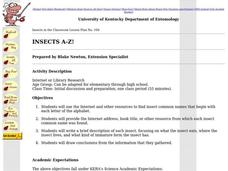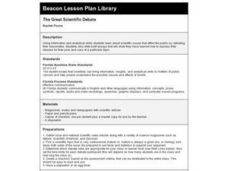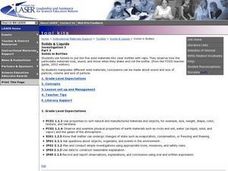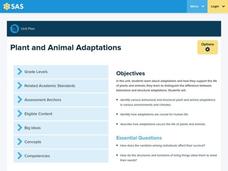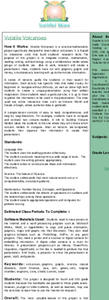Curated OER
Trail Adventure
Learners create a trail with numbered specimens. Students complete an accurate and functional interactive trail activity brochure. They complete a web page tree identification guide and interactive identification activity. Learners...
Curated OER
Got Biodiversity?
Students examine the concept of biodiversity. Using the internet, they complete small activities in which they work together. Using the information they collected, they create a class book, make murals and write in their journals.
Curated OER
Insects A-Z!
Students use the Internet and other resources to find insect common names that begin with each letter of the alphabet. They write a brief description of each insect, focusing on what the insect eats and where the insect lives.
Curated OER
The Great Spider Debate
Students study about the survival and hunting strategies of several different kinds of spiders. They also be introduced to scientific classification of spiders and write a brief report about one of the spider families they observe.
Curated OER
The Great Scientific Debate
Fourth graders examine scientific issues that affect the public by debating their classmates. They also write brief essays that show they have learned how to express their reasons for their pros and cons of a particular topic.
Curated OER
A River Ran Wild
Young scholars describe and illustrate pollution and how to clean up pollution. They display their solutions by creating posters, signs, bumper stickers, slogans, T-shirt designs, commercials and poetry. This lesson ties in with 'A River...
Curated OER
DID YOU HELP CREATE THIS
Students examine whether their actions are positively or negatively affecting organisms and their habitats. They choose an animal to study then create a multimedia presentation including charts and graphs of data logger information and...
Curated OER
A Sense of West Virginia
Students consider their perceptions of the world through their 5 senses while visiting the West Virginia State Museum. In this West Virginia history lesson, students discover how knowing about the past helps with their understanding of...
Curated OER
Classification of Materials
Students classify photographs into a two-way classification system. They practice with pictures of people who are young and old, male and female, then they use pictures of animals to create their own two-way classification system.
Curated OER
RIDE THE WILD LEAF
Students identify and interpret that leaves provide food for new trees and plants. Students cut out leaves and glue them on the appropriate
number on included worksheet. Students collect different types of leaves and make leaf rubbings....
Curated OER
Animal Electronic I.D.
Students discover ways to keep the animals in our environment safe by examining electronic I.D. tags. In this animal safety lesson, students participate in a role-playing activity in which they are monitored by an electronic I.D. tag. ...
Curated OER
Food Travels and Preservation
Fourth graders study food processing and distribution. In this food processing lesson, 4th graders investigate various methods of food preservation. Students study methods of food distribution.
Curated OER
What's it Like Inside the Sun?
Students perform experiment in which they model convection as it occurs in our Sun. They also explain that convection acts where the effect of gravity and heat are present (low density fluids can rise and cool, and high density fluids...
Curated OER
Particulate Matter: How Dirty is the Air We Breathe?
Fourth graders create a simple testing device and collect and observe the pollution in the air we breathe.
Curated OER
When Fish Die
Learners discuss what to do with a very sick fish and help it to die without much pain. As a class, they answer questions about the fish and if they believe it is suffering or not. Using their own experiences, they share how they dealt...
Curated OER
Solids in Bottles
Students use funnels to put the five solid materials into clear bottles with caps. They observe how the particulate materials look, sound, and move when they shake and roll the bottle. Finally, students write "sound and touch" poetry.
Curated OER
The Cycle of Restoration
Students describe what is meant by restoration cycle. In groups, they create a poster to show the cycle of restoration work. After presenting their poster, they discuss the actions that can be done for each season. To end the lesson,...
Curated OER
Food Webs
Fourth graders discover how organisms depend upon each other in an ecosystem. In this ecosystems lesson, 4th graders use food webs to discuss the interdependence between organisms in an ecosystem.
Pennsylvania Department of Education
Plant and Animal Adaptations
Fourth graders identify behavioral and structural adaptations to plant and animal life. In this unit overview, 4th graders discuss the importance of variation and adaptation in a species survival. This is a unit overview and does not...
Curated OER
Understanding Human Population Growth
You can help students learn about the causes and consequences of our rapidly growing global population
Curated OER
Volatile Volcanoes
Learners have fun with graphics, graphs and money, simultaneously learning with up-to-the-minute information.
Curated OER
Blowing in the Wind
Students compare hurricanes and tornadoes. They write a paragraph explaining how to prepare for a storm. Students give an oral report. They use weather facts to practice math skills. Students record observations of a storm.




